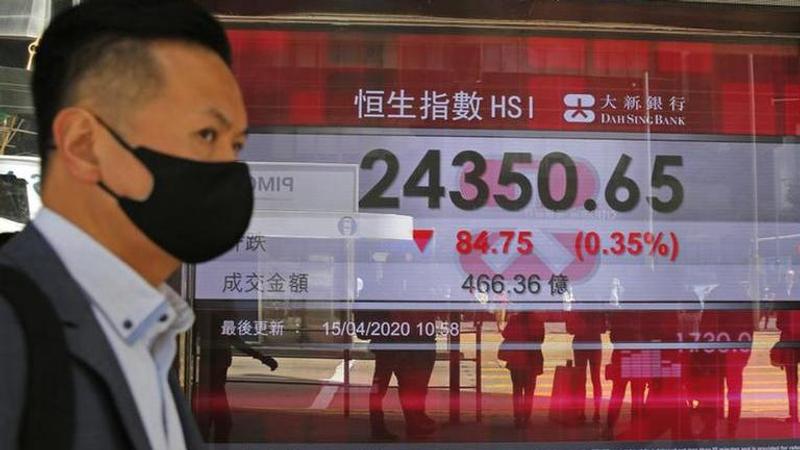Published 14:58 IST, April 15th 2020
Asian stocks sink after IMF says global economy will shrink
Asian stocks skidded Wednesday after the International Monetary Fund said the global economy will suffer its worst year since the Great Depression of the 1930s due to the coronavirus pandemic.

Asian stocks skidded Wednesday after the International Monetary Fund said the global economy will suffer its worst year since the Great Depression of the 1930s due to the coronavirus pandemic.
Benchmarks in Shanghai, Tokyo, Hong Kong and Sydney declined despite Wall Street's overnight gain driven by buying of technology stocks. India advanced.
The IMF's latest forecast said this year's global economic output will shrink by 3%, a bigger loss than 2009's 0.1% decline. That was a marked reverse from the Fund's previous forecast in January of 3.3% growth before the virus prompted governments to shut down factories, travel and other industries.
“The IMF forecast a deep economic winter," said Hayaki Narita of Mizuho Bank in a report. Narita said, however, investors appear to be looking past that to the IMF's outlook for a “spring-back in growth” to 5.8% next year.
The IMF’s chief economist, Gita Gopinath, said the loss to global gross domestic product, the broadest gauge of economic output, could amount to $9 trillion, or more than the economies of Germany and Japan combined.
The Shanghai Composite Index lost 0.5% to 2,812.23 and the Nikkei 225 in Tokyo declined 0.5% to 19,550.09. Hong Kong's Hang Seng was off 0.7% at 24,260.90.
The S&P-ASX 200 in Sydney lost 0.4% to 5,466.70 while India's Sensex opened up 2.5% at 31,446.28. New Zealand advanced while Jakarta declined and Singapore was unchanged.
On Wall Street, the benchmark S&P 500 index climbed 3.1% on Tuesday to 2,846.06. The benchmark index surged 12% last week, though it is about 16% below its all-time high set in February.
The Dow Jones Industrial Average gained 2.4% to 23,949.76.
Technology stocks powered much of the gains. Microsoft climbed 4.9% and Apple rose 5.1%.
Johnson & Johnson climbed 4.5% after reporting a stronger profit for the first three months of the year than Wall Street expected. It raised its dividend, bucking a trend as companies try to conserve cash, even though the health care giant also had to slash its outlook.
Investors are focusing on how and when authorities may begin to ease business shutdowns and limits on people’s movements imposed to slow the spread of the coronavirus.
President Donald Trump has been discussing with officials how to roll back federal social distancing recommendations that expire at the end of the month. And governors around the U.S. have begun collaborating on plans to reopen their economies in what is likely to be a gradual process to prevent the coronavirus from rebounding.
The discussions follow signs the outbreak may be leveling off in some of the hardest-hit areas, including New York City.
In Italy, Spain and other places around Europe where infections and deaths have begun stabilizing, the process of reopening economies is already underway. Some businesses and industries are allowed to reopen in a calibrated effort aimed at balancing public health against their countries’ economic well-being.
The IMF expects economic contractions this year of 5.9% in the United States, 7.5% in the 19 European countries that share the euro currency, 5.2% in Japan and 6.5% in the United Kingdom. The Fund said China, where the pandemic originated, should eke out 1.2% growth this year, better than some private sector forecasters who expect little to no growth in the world’s second-biggest economy.
China has reopened factories, shops and other businesses after declaring victory over the outbreak while the United States and Europe still are tightening controls. Still, forecasters say it will be months before Chinese industries return to normal output and exporters will be hurt by depressed global demand.
While Wall Street expects profits will be down for most companies in the S&P 500, the focus is on what management teams have to say about what profits look like for the rest of the year.
Analysts are forecasting a drop of roughly 10% in earnings per share for S&P 500 companies for the first quarter and 21% for the second quarter.
ENERGY: Benchmark U.S. crude gained 45 cents to $20.56 per barrel in electronic trading on the New York Mercantile Exchange. The contract lost $2.30, or 10.3%, on Tuesday to close at $20.11. Brent crude, the standard for international oils, advanced 40 cents to $30.00 per barrel in London. It dropped $2.14 the previous session to close at $29.60 a barrel.
CURRENCY: The dollar declined to 107.11 yen from Tuesday's 107.17 yen. The euro retreated to $1.0966 from $1.0981.
Updated 14:58 IST, April 15th 2020




